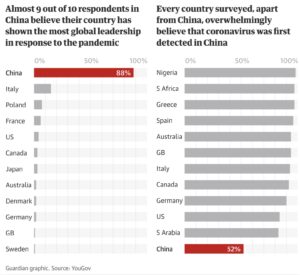Overall, the poll suggests there is a receptive global audience for the next US president, if he chooses, to construct an international alliance to challenge China’s growing political dominance, and to question the moral values of its leadership. There is no sense in the findings, however, that the US would be able to exploit its handling of the crisis to take on that leadership role.
The survey shows that in every country surveyed, apart from China, the public overwhelmingly believe that coronavirus was first detected in China. Nigeria had the highest rate (98%), closely followed by Greece and South Africa (97%) and Spain (96%). The countries with the lowest rates, apart from China, were Saudi Arabia, where 83% thought China was responsible, and the US (84%).
By contrast, only 52% of respondents in China believe that coronavirus was first detected in the country and just over one in 10 (12%) of respondents in China said they did not know when asked in which country the virus was first detected. Just under a third of these respondents believe the virus was first detected in the US.
Majorities in most countries also do not believe the Chinese government was transparent about coronavirus when it was first detected in the country at the end of 2019.
In Great Britain, four in five respondents believe that the Chinese authorities tried to hide the truth. Japan (84%) followed by Spain (82%) has the highest rate of respondents who believe the Chinese authorities tried to hide the truth, but the numbers are similar through the EU.
The public is less certain whether China sought to punish the doctors that first detected the virus, but majorities in every European country surveyed, save Greece, think China either definitely or probably sought to do so.
China will likely be disturbed that majorities in South Africa and Nigeria thought the country went to the extreme of punishing doctors. China has often regarded Africa as one of its more stable sources of political support.
Large numbers in many countries, often a fifth, say they simply do not know if doctors were targeted, an issue that is likely to be explored by the World Health Organization’s external inquiry into the virus outbreak.
Many also blame the Chinese government by saying it could have prevented the spread of the virus. In Great Britain, 67% of respondents believe that the international spread of the virus could have been prevented if the Chinese government had responded more quickly.
Opinion is divided about the country that has shown the most global leadership in the crisis, but the predominant finding is that no single country is singled out for this accolade.
Within China, nearly nine out of 10 respondents claim their government has shown the most global leadership. However, this view is hardly reflected globally with negligible numbers in Europe praising China.
The number of respondents praising China range from Sweden (1%), Great Britain (1%) Germany (2%), Australia (2%) and Japan (3%). In Thailand and Egypt more than a fifth cite China, but the most striking finding is how few people can point to any country as showing leadership.
A few countries praise Germany, but no country is seen as an inspirational leader. Only in Nigeria and the US did more than a fifth single out US leadership.


